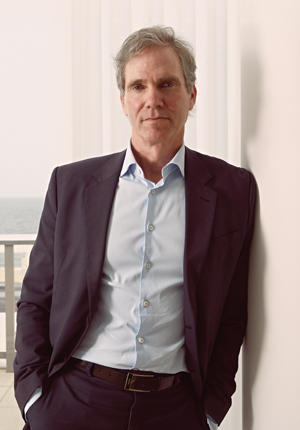Trending
The Closing: Jay Sugarman
The iStar CEO on working for high-net worth families, investing in Sex Dust and owning one of the world’s largest romance comic collections

Jay Sugarman, chairman and CEO of the real estate investment trust iStar, hates being called a developer. The Princeton graduate much prefers “creator” or “innovator,” though “financier” or “ground-lease evangelist” might be more accurate. Sugarman’s firm, which he founded as a part of Starwood Capital Group in 1993 before taking it public five years later, has closed more than $40 billion in debt and net leasing deals. And in 2017, iStar launched Safehold — the first public company to focus exclusively on ground leases. That marks a significant shift in Sugarman’s business strategy. This past February, iStar announced plans to sell off nearly $500 million in assets over the next two years to help grow its ground-lease business. At the same time, Sugarman and his associates are tasked with transforming a 1.25-mile stretch of Asbury Park as the master developer for the city’s waterfront. Under the $1 billion-plus redevelopment plan, they plan to add more than 2,000 homes and 300 hotel rooms to the New Jersey beach town over the next decade. Sugarman and his wife, designer Kelly Behun, live in Hell’s Kitchen with their two sons. The couple also own a home they recently had built in Southampton.
DOB: April 12, 1962
Lives in: Manhattan
Hometown: Houston
Family: Married with two sons (ages 16 and 19)
Where did you grow up? I was born in Houston. [My family] moved to London when I was eight, and we moved to Pittsburgh when I was 11. I went to nine schools in 10 years.
What did your parents do? My father was with an oil company, Gulf Oil, so we moved around. But when I found New York as a freshman in college, I knew I was a New Yorker. I’ve been a New Yorker ever since.
What was it like moving from school to school? That was interesting. You’re a new kid, so you always had to figure out how to get inside. These people have all been together their entire lives; how do I connect with that really quickly? So you become incredibly observant. You watch first and try to figure out, where’s the power? Where’s the code? How do I crack this? How do I get in with the people I want to be friends with? And you’ll always be a little bit of an outsider. You’ll never be part of the history. So you have to be a little quirky, you have to be a little different, so people go, “That’s interesting.”
In what way? When I lived in London, I was a big “Monty Python” fan, so I had that kind of British sense of humor. [I] don’t drink, don’t smoke, don’t swear, don’t do any of that, so immediately you’re an outsider. But that also gives you a chance to observe people and see what makes them tick and be friends with them in maybe a different way. That’s kind of what we do here: Normally people do it this way, but what if you turned it this way? I think that’s what drives me.
Is there anything else that set you apart at the time? I have one of the world’s largest romance comic book collections, because the art of the 1960s is fantastic and nobody really paid any attention to it. And it comes in a format where you can buy it for 10 cents. “Girls’ Love Stories” “Girls’ Romances,” “Young Love,” “Young Romances,” “Heart Throbs,” “Secret Hearts” and “Falling in Love” were the big seven titles. A lot of those storylines were purchased by the daytime soap operas.

How did you get into real estate? Around 1990, I was working for two high-net-worth families, trying to find ways to invest their capital with a partner. We both looked in the Wall Street Journal for two weeks in a row, and every headline was “Real estate is the worst business.” I knew nothing about real estate. But when you see something for two weeks be absolutely thrashed in the media, and you realize that it’s the largest part of the capital markets in the U.S., you sort of sense that there’s an opportunity. So we decided we needed to start a real estate business right then and there.
What was it like managing investment funds for the Burden, Vanderbilt and Ziff families? I had come out of business school and worked for a guy called Richard Rainwater. He had mentored me by saying, “If you really wanna see what you can do, get in front of a pool of capital that allows you to do anything.” Families can think in unconventional ways because they don’t have shareholders and they don’t have boards of directors. Both the Ziff and the Burden families, for whatever reason, hired my partner and I at a very young age and let us think that way. And we made plenty of mistakes, but we also learned quickly how to be two steps ahead.
During the financial crisis, you forfeited 2 million restricted shares in iStar that weren’t performing well. What were the biggest lessons you learned from that time? You can never afford to take your eye off the ball. I was going to retire in 2005 and I got very close to making that decision, and then the world changed. I wasn’t looking forward anymore. You can’t do that. That’s when you get caught. I had a cardinal rule: Liquidity is everything. But we got sloppy on liquidity. It killed us. Personally, it cost me a lot of years of my life, but I refuse to see a great company not come back, and we’ve been fighting ever since. It’s forced us to learn a whole new set of skills.
What was your first interaction with Asbury Park? I brought a date here 30 years ago. That was my first time in Asbury. It was a ruin. It was beautiful … But it was the wrong place to bring a date. I had a roommate who played Bruce Springsteen every minute of every day, so I was somehow subconsciously being drawn to Asbury Park, but I didn’t know it.
Why do you think there’s been some skepticism that a $6 million penthouse can sell in Asbury Park? Human beings aren’t that different, wherever you go. If you give them a great design, and a beautiful environment and a wonderful city and an incredible lifestyle, think about what that would cost you in New York or Montauk or the Catskills … We’ve suffered from headlines that say we’re selling $6 million condos. They don’t mention the $400,000 townhouses and some of the other projects we’re bringing. But this has to be aspirational.
What other projects are you working on? The ground-leasing business is really all-consuming right now. We’re the largest owner of bowling alleys in the world. We have built a great relationship with the largest operator of bowling alleys, company called Bowlero. We have 10,000 lanes in our portfolio. When you think about places where unconventional thinking can unlock a lot of value, nobody thinks of bowling as a business. But as a real estate business, it’s really interesting to us.
Why did you decide to become the managing owner of Keystone Sports [and the Philadelphia Union MLS soccer team]? I love sports. I love the unpredictability of it. I have two young boys, not so young anymore. That’s all we did together. Our hallway was our batting practice, pitching practice, soccer field. I knew the thing that would keep us together as a family for a long time was having something like that to always share. The good news is Philadelphia was within an hour-and-a-half radius of New York, so I knew I could go be an active participant, but it was far enough away that when the fans started yelling, I could retreat back to New York. We’re 10 years in, and we’re starting to figure it out.
How have you responded to criticism from Philadelphia Union fans regarding the need to recruit more top talent to the team? We’re trying to build a team that develops players. I think if we spend a lot of money on development, when others aren’t, we will have a very sustainable winning strategy when the league is much bigger. If we spend $10 million on a player, and he gets hurt, we’ve kind of got nothing left. It hurts when the fans are on you all the time, but winning solves a lot of problems in Philadelphia. So we just need to start winning.
What are your hobbies, aside from bowling and running a sports team? I practice with U.S. Open champion table tennis player Michael Landers. I love learning skills like that, that are outside the mainstream. I get to play with my kids at a wildly different level than I’ve ever played before.
Does your wife play? She hates sports. She’s a great designer, though, and has an incredible eye for spaces. Wish I could use her in these projects, but we’ve never crossed that line.
You and your wife have thrown some lavish parties at your Hamptons estate over the years [for charities and friends]. What was the most memorable of those? We try to keep that part of our life compartmentalized.
Have you ever hosted a fundraiser to encourage healthy eating, given that your last name contains “sugar”? I do have a big investment in a company called Moon Juice, which is one of the best adaptogenic, plant-based food companies out there. It’s got Sex Dust, Brain Dust, Beauty Dust, Power Dust, Spirit Dust and Dream Dust. If anything helps you feel better about life, it’s lowering your stress levels.
What’s your biggest vice? Cotton candy. There couldn’t be anything worse. But man is it good. If I go to a carnival, I want cotton candy. I’ll say that.
—Edited and condensed for clarity




